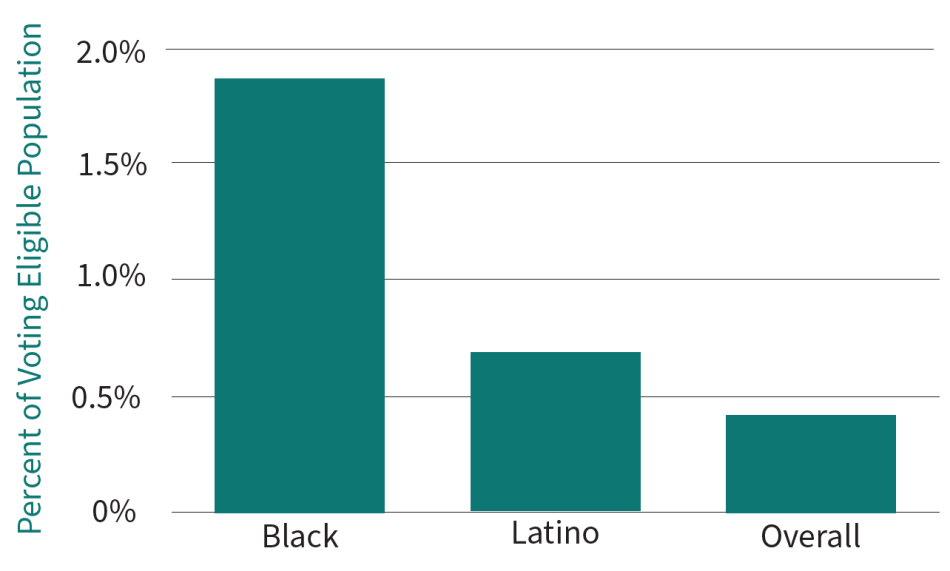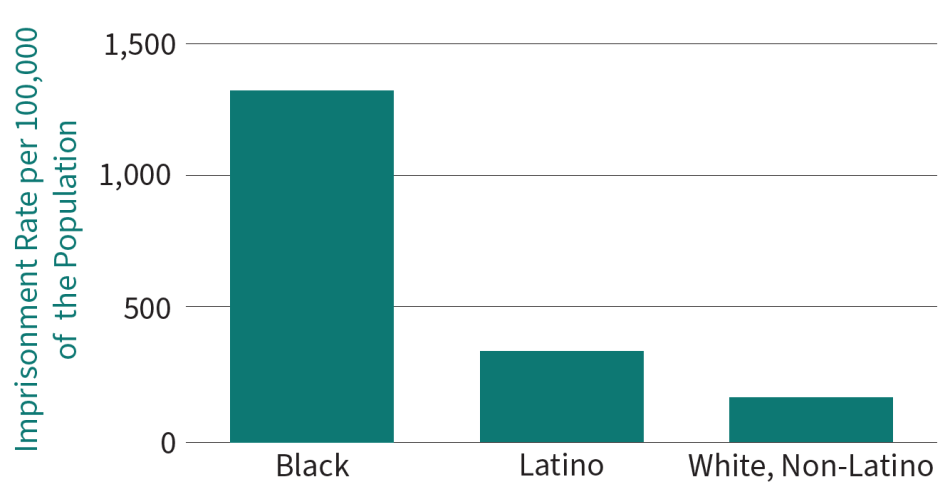Pennsylvania Should Restore Voting Rights to Over 41,000 Citizens
Black Pennsylvanians are excluded from voting at almost eight times the rate of non-Black Pennsylvanians. Latino Pennsylvanians are excluded at almost twice the rate of non-Latino Pennsylvanians.
Related to: Voting Rights, Racial Justice, State Advocacy
Pennsylvania denies the right to vote to over 41,000 citizens due to imprisonment for a felony conviction.1 This voter exclusion falls heavily on people of color. Black Pennsylvanians are excluded from voting at almost eight times the rate of non-Black Pennsylvanians. Latino Pennsylvanians are excluded at almost twice the rate of non-Latino Pennsylvanians.2
Voter Exclusion Rates in Pennsylvania by Race and Ethnicity, 2024

Source: Uggen, C., Larson, R., Shannon, S., Stewart, R. & Hauf, M. (2024). Locked out 2024: Four million denied voting rights due to a felony conviction. The Sentencing Project.
To ameliorate hardships faced by communities of color and protect its democratic values, Pennsylvania lawmakers should follow the lead of Maine, Vermont, Puerto Rico, and Washington, DC and extend voting rights to persons completing felony sentences in prisons and jails.
Expanding Voting Rights in Pennsylvania is a Racial Justice Issue
Pennsylvania’s felony disenfranchisement laws reinforce the racial disparities in the state’s criminal legal system. These disparities have been documented at various decision points from law enforcement encounters to corrections. Black Pennsylvanians comprise just 10% of the state’s population but represent 46% of all persons confined to prison.3 Black Pennsylvanians are over seven times as likely as white Pennsylvanians to be imprisoned. Latino Pennsylvanians are imprisoned at a rate that is almost twice the rate for white Pennsylvanians.4
Imprisonment Rates in Pennsylvania by Race and Ethnicity, 2024

Sources: Pennsylvania Department of Corrections. (2023). Annual statistical report as at December 31, 2023. Pennsylvania Department of Corrections; U.S. Census Bureau (2023). Hispanic or Latino origin by race. American Community Survey, ACS 5-year estimates detailed tables, table B03002. U.S. Census Bureau.
Felony disenfranchisement bears unequal weight on communities of color in Pennsylvania because of disparities in the state’s criminal legal system. Differences in incarceration rates go beyond differences in criminal offending and stem in part from bias throughout Pennsylvania’s criminal legal system. For example:
- A joint investigation by the Pittsburgh City Controller and Citizen Police Review Board in 2022 found that Black residents comprised 85% of all marijuana-related charges while representing just 23% of the city’s population.5 Marijuana usage has been decriminalized in Pittsburgh since 2016.
- Pennsylvania’s sentencing guidelines recommend imprisonment at a significantly higher rate and for a much longer duration for people with a higher Prior Record Score (PRS)—“sometimes months or years more prison time.”6 The PRS has been shown to be a weak predictor of future recidivism. But its use in sentencing is known to increase the imprisonment of Black Pennsylvanians, who are more likely to live in neighborhoods that experience higher rates of police stops and searches.7
Leigh Owens, executive director of the PENNfranchise Project, has said: “Nearly 43,000 individuals, many of them people of color, could be the voting block that finally tips the scales of power in Pennsylvania toward the people. If our elected officials knew that their incarcerated constituents could cast a ballot, perhaps they would care more about the conditions inside these facilities and the conditions and laws that lead to mass incarceration.”8 Pennsylvania must advance racial justice by re-enfranchising its entire voting age population.
Supporting Voting Rights Improves Public Safety
Research shows that an opportunity to participate in democracy has the potential to reduce one’s perceived status as an “outsider.” The act of voting can have a meaningful and sustaining positive influence on justice-impacted citizens by making them feel they belong to a community.9 Having a say and a stake in the life and well-being of your community is at the heart of our democracy.
Re-enfranchisement can facilitate successful re-entry and reduce recidivism. The University of Minnesota’s Christopher Uggen and New York University’s Jeff Manza find that among people with a prior arrest, there are “consistent differences between voters and non-voters in rates of subsequent arrest, incarceration, and self-reported criminal behavior.”10 Research also suggests having the right to vote immediately after incarceration matters for public safety. Individuals in states which continued to restrict the right to vote after incarceration were found to have a higher likelihood of experiencing a subsequent arrest compared to individuals in states who had their voting rights restored post-incarceration.11 Given re-enfranchisement misinformation and obstacles facing justice-impacted citizens upon re-entry into our communities, one path to bolster public safety and promote prosocial identities is to preserve voting rights during incarceration.
Allowing people to vote, including persons completing felony sentences in prisons or jails, prepares them for more successful reentry and bolsters a civic identity. By ending disenfranchisement as a consequence of incarceration, Pennsylvania can improve public safety while also promoting reintegrative prosocial behaviors.
Pennsylvania Can Strengthen its Democracy by Restoring the Right to Vote
Since 1997, 26 states and the District of Columbia have expanded voting rights to people living with felony convictions. As a result, over 2 million Americans have regained the right to vote.12 State Representative Chris Rabb has said, “We know that racism and felony disenfranchisement have an intertwined history. The only way to create equitable political power across all our communities is to adopt strong legislative actions to reduce inequity and entrenched racial disparities in the system.”13
Pennsylvania should join Maine, Vermont, Puerto Rico, and Washington, DC in ensuring all of their citizens can participate in our democratic process. This would underscore respect for the state constitution, which states that “all power is inherent in the people, and all free governments are founded on their authority and instituted for their peace, safety and happiness.”14 By reenfranchising its entire voting eligible population, Pennsylvania would promote public safety and the value of democratic participation.
| 1. | Uggen, C., Larson, R., Shannon, S., Stewart, R. & Hauf, M. (2024). Locked out 2024: Four million denied voting rights due to a felony conviction. The Sentencing Project. |
|---|---|
| 2. | Uggen, C., Larson, R., Shannon, S., Stewart, R. & Hauf, M. (2024). Locked out 2024: Four million denied voting rights due to a felony conviction. The Sentencing Project. |
| 3. | Pennsylvania Department of Corrections. (2023). Annual statistical report as at December 31, 2023. Pennsylvania Department of Corrections; U.S. Census Bureau (2023). Hispanic or Latino origin by race. American Community Survey, ACS 5-year estimates detailed tables, table B03002. U.S. Census Bureau. |
| 4. | Pennsylvania Department of Corrections. (2023). Annual statistical report as at December 31, 2023. Pennsylvania Department of Corrections; U.S. Census Bureau (2023). Hispanic or Latino origin by race. American Community Survey, ACS 5-year estimates detailed tables, table B03002. U.S. Census Bureau. |
| 5. | Dabkowski, J. (2022, May 31). Joint audit of Pittsburgh police finds racial disparities in marijuana charges. Pennsylvania Capital-Star. |
| 6. | Hester, R. (2018). Prior record and recidivism risk. American Journal of Criminal Justice, 44, 353-375, p. 369. https://doi.org/10.1007/s12103-018-9460-8 |
| 7. | Melamed, S. (2019, October 19). As Philadelphia aims to curb racial disparities, why are police stops of black drivers skyrocketing?. The Philadelphia Inquirer. |
| 8. | Office of Representative Rick Krajewski. (2022, November 1). State officials, civil rights groups react to report denying thousands in Pa. their voting rights due to felony convictions. 188th District, Philadelphia County. |
| 9. | Budd, K. M., & Monazzam, N. (2023). Increasing public safety by restoring voting rights. The Sentencing Project; Bragg, A.H., & Lewis, C. (2017). Felon disenfranchisement. Annual Review of Law and Social Science, 13, 295-311. https://doi.org/10.1146/annurev-lawsocsci-110316-113558. |
| 10. | Uggen, C., & Manza, J. (2004). Voting and subsequent crime and arrest: Evidence from a community sample. Columbia Human Rights Law Review, 36(1), 193-216. |
| 11. | Budd, K. M., & Monazzam, N. (2023). Increasing public safety by restoring voting rights. The Sentencing Project. |
| 12. | Porter, N. D., & McLeod, M. (2023). Expanding the vote: State felony disenfranchisement reform, 1997-2023. The Sentencing Project. |
| 13. | Office of Representative Rick Krajewski. (2022, November 1). State officials, civil rights groups react to report denying thousands in Pa. their voting rights due to felony convictions. 188th District, Philadelphia County. |
| 14. |


